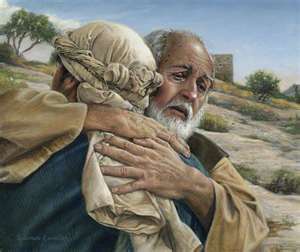Today’s Gospel continues one of the primary themes of the Bible, the surprising and unrelenting mercy of God. Perhaps the Gospel of Luke best portrays this loving trait of mercy, most especially in Chapter 15 where Jesus speaks of the lost coin, the lost sheep, and the prodigal son, each of which are occasions to remind us of the joy God experiences in extending us mercy.
Pope Francis in a September 2013 Angelus address had this to say about the 15th chapter of St. Luke’s Gospel:
 Here is the entire Gospel! Here! The whole Gospel, all of Christianity, is here! But make sure that it is not sentiment; it is not being a “do-gooder”! On the contrary, mercy is the true force that can save man and the world from the “cancer” that is sin, moral evil, and spiritual evil. Only love fills the void, the negative chasms that evil opens in hearts and in history. Only love can do this, and this is God’s joy! (Pope Francis, Sunday Angelus, Sep 15, 2013)
Here is the entire Gospel! Here! The whole Gospel, all of Christianity, is here! But make sure that it is not sentiment; it is not being a “do-gooder”! On the contrary, mercy is the true force that can save man and the world from the “cancer” that is sin, moral evil, and spiritual evil. Only love fills the void, the negative chasms that evil opens in hearts and in history. Only love can do this, and this is God’s joy! (Pope Francis, Sunday Angelus, Sep 15, 2013)
Mercy is the true power that can save humanity and the world from sin and evil.” (Pope Francis, Tweet, October 7, 2013)
Perhaps most telling of the centrality that mercy plays in Pope Francis’ life and ministry is his episcopal moto: Miserando Atque Eligendo, which translated means, “Having Mercy and Calling me.” Cardinal O’Malley when speaking of Pope Francis’ motto at a recent address given in Baltimore recalls the significance of the Pope’s own experience of mercy in his life. He offered that his encounter with Christ, triggered by mercy, leads to a new morality. This morality is not a titanic effort of the will, but rather a response to a surprising, unforeseeable and unjust mercy. One’s life then is not so much a matter of ‘never falling down’ but an ‘always getting up again.’
In every Mass, after the Lord’s Prayer, before receiving Communion, the priest prays: “Deliver us, LORD, we pray, from every evil, graciously grant peace in our days, that, by the help of your mercy, we may be always free from sin and safe from all distress…” Here the Church is teaching us that it is only by God’s mercy that we are capable of being without sin (through reconciliation.)
Each of us are called, particularly during the season of Lent to a profound sense and personal experience of the mercy of God – a mercy that stands as true justice – a justice that is beyond this world. Does this profound sense of mercy flow from our own experience of encountering Christ? Can I even describe my encounter with Christ? The apostles could name the hour: “It was about four in the afternoon.” (John 1:39)
We are now just over half way through the Lenten journey. Have you made your way to the Sacrament of Reconciliation (confession)? Are you planning on giving God the opportunity to surprise you with his mercy? This is the gift of God that renews the Baptismal grace within us, which is nothing less than the Divine Life and Love of God.
May the words of the tax collector in today’s Gospel be ours each and every day:
“O God, be merciful to me, a sinner.”
+pde
0